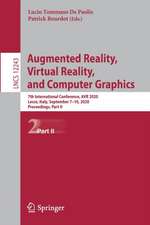Foundations of Data Visualization
Editat de Min Chen, Helwig Hauser, Penny Rheingans, Gerik Scheuermannen Limba Engleză Hardback – 12 aug 2020
| Toate formatele și edițiile | Preț | Express |
|---|---|---|
| Paperback (1) | 1163.21 lei 6-8 săpt. | |
| Springer International Publishing – 13 aug 2021 | 1163.21 lei 6-8 săpt. | |
| Hardback (1) | 1169.64 lei 6-8 săpt. | |
| Springer International Publishing – 12 aug 2020 | 1169.64 lei 6-8 săpt. |
Preț: 1169.64 lei
Preț vechi: 1462.05 lei
-20% Nou
Puncte Express: 1754
Preț estimativ în valută:
223.80€ • 234.30$ • 185.19£
223.80€ • 234.30$ • 185.19£
Carte tipărită la comandă
Livrare economică 05-19 aprilie
Preluare comenzi: 021 569.72.76
Specificații
ISBN-13: 9783030344436
ISBN-10: 3030344436
Ilustrații: XVII, 389 p. 110 illus., 101 illus. in color.
Dimensiuni: 155 x 235 mm
Greutate: 0.74 kg
Ediția:1st ed. 2020
Editura: Springer International Publishing
Colecția Springer
Locul publicării:Cham, Switzerland
ISBN-10: 3030344436
Ilustrații: XVII, 389 p. 110 illus., 101 illus. in color.
Dimensiuni: 155 x 235 mm
Greutate: 0.74 kg
Ediția:1st ed. 2020
Editura: Springer International Publishing
Colecția Springer
Locul publicării:Cham, Switzerland
Cuprins
Part I: Theoretical Underpinnings of Data Visualization.- The Fabric of Visualization.- Visual Abstraction.- Measures in Visualization Space.- Knowledge-Assisted Visualization and Guidance.- Mathematical Foundations in Visualizations.- Transformations, Mappings and Data Summaries.- Part II: Empirical Studies in Visualization.- A Survey of Variables Used in Empirical Studies for Visualization.- Empirical Evaluations with Domain Experts.- Evaluation of Visualization Systems with Long-term Case Studies.- Vis4Vis: Visualization for (Empirical) Visualization Research.- 'Isms' in Visualization.- Open Challenges in Empirical Visualization Research.- Part III: Collaboration with Domain Experts.- Case Studies for Working with Domain Experts.- Collaboration Between Industry and University.- Collaborating Successfully with Domain Experts.- Part IV: Developing Visualizations for Broad Audiences.- Reflections on Visualization for Broad Audiences.- Reaching Broad Audiences from a Research InstituteSetting.- Reaching Broad Audiences from a Large Agency Setting.- Reaching Broad Audiences from a Science Center or Museum Setting.- Reaching Broad Audiences in an Educational Setting.- Challenges and Open Issues in Visualization for Broad Audiences
Notă biografică
Textul de pe ultima copertă
This is the first book that focuses entirely on the fundamental questions in visualization. Unlike other existing books in the field, it contains discussions that go far beyond individual visual representations and individual visualization algorithms. It offers a collection of investigative discourses that probe these questions from different perspectives, including concepts that help frame these questions and their potential answers, mathematical methods that underpin the scientific reasoning of these questions, empirical methods that facilitate the validation and falsification of potential answers, and case studies that stimulate hypotheses about potential answers while providing practical evidence for such hypotheses. Readers are not instructed to follow a specific theory, but their attention is brought to a broad range of schools of thoughts and different ways of investigating fundamental questions. As such, the book represents the by now most significant collective effort for gathering a large collection of discourses on the foundation of data visualization.
Data visualization is a relatively young scientific discipline. Over the last three decades, a large collection of computer-supported visualization techniques have been developed, and the merits and benefits of using these techniques have been evidenced by numerous applications in practice. These technical advancements have given rise to the scientific curiosity about some fundamental questions such as why and how visualization works, when it is useful or effective and when it is not, what are the primary factors affecting its usefulness and effectiveness, and so on. This book signifies timely and exciting opportunities to answer such fundamental questions by building on the wealth of knowledge and experience accumulated in developing and deploying visualization technology in practice.
Caracteristici
Enriches readers’ broad appreciation of the connections from theoretical and mathematical research to empirical studies and application case studies Stimulates readers’ insight into the scientific foundations of data visualization Inspires readers to make ground-breaking contributions to the discipline of visualization
























